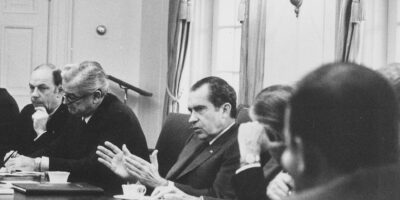Your State Matters More Than You May Think

Since the Civil Rights Movement, Americans have had a strong sense that their state of residence does not matter much to the enjoyment of their fundamental rights. The federal government seems to reign supreme, so many Americans base their residency decisions on job and climate preferences and such. Young trappers move to Alaska and old beachcombers to Florida and so forth. Most Americans with standard occupations and tastes now follow the polite advice of TLC and stick to the rivers and lakes that they are used to.
The lockdown crisis and urban uprisings have induced some high-profile business leaders, including Elon Musk, to question the assumption that all Americans enjoy equal economic rights and personal freedoms. Clearly, the governors of some states de facto possess much more “police power” (a telling term) than others, so millions of Americans, especially small business owners, must be wondering if state amenities, like California’s climate, New Jersey’s proximity to Manhattan, or Michigan’s forests are really worth the risk to their liberty.
If you think that a given state’s over-the-top response to a once-in-a-lifetime (knock wood) pandemic is insufficient reason to move out, note that each state has long had its own economic freedom score, that the scores varied widely before the pandemic, and have widened with it because the least (most) free states have, for the most part, lived up to their reputations in 2020.
Even more disturbing than the wide variance in economic freedom from state to state, the bottom, so to speak, has yet to be tested. After surveying U.S. Supreme Court (SCOTUS) cases from the Founding to the present, I cannot reject the hypothesis that California, Vermont, or some other states could become communist and the federal government could not, under current precedent, do much of anything about it.
I do not mean communist in some exaggerated ideological sense, I mean that a state government, without federal interference, could seize the means of production in their state and fix prices across the state’s economy. It could also force state residents to do, or not do, certain types of work and abolish the private ownership of real estate and other assets.
Yes, this sounds absurd but the absurdity would be in the adoption of such policies, not in their legal possibility, which currently is barred only by state constitutions, laws, and legal precedents, not federal ones. This will take some explanation but please stick with it until the end. Your livelihood, if not your life, may depend on it. If that sounds overly dramatic, just reflect on the difference between what you believed was possible in February of this year and what you believe now.
The possibility of a communist state or states arises due to the difference between enumerated and unenumerated Constitutional rights. The former includes free speech (1st Amendment), bearing firearms (2nd Amendment), and due process (5th Amendment), while the latter includes most economic rights purposely not listed in the Ninth Amendment, which reads “the enumeration in the Constitution, of certain rights, shall not be construed to deny or disparage others retained by the people.”
Early in the nation’s history, SCOTUS looked to the Constitution’s Preamble and a shared sense of unenumerated economic rights to limit federal interference with economic freedom. In Calder v. Bull (1798), for example, SCOTUS rested its decision on the Preamble, the tenor of which made clear that “there are acts which the Federal, or State, Legislature cannot do, without exceeding their authority.” The Marshall Court also relied on notions of natural rights, the Preamble, and the Fifth and Ninth Amendments to limit the scope of government and maximize individual liberty by striking down, for example, vestiges of Colonial-era economic regulations like the assize of bread.
Liberty the Founders viewed in the negative sense later famously explicated by John Stuart Mill, the right to do as they wished so long as they did not interfere with others. So they viewed liberty in a Proprietarian sense, conceiving each free person as a business, in the sense of being the sole proprietor of him or herself (Yes, women too. Vide my Financial Exclusion for a survey). Everyone, British political philosopher John Locke explained, enjoyed an exclusive “property in his own person.” The right to toil as one saw fit, political economist Adam Smith argued, was the root of all property and hence “sacred” and inviolable. Early antipathy towards government grants of monopoly was rooted, in part, on the restrictions monopolies placed on the natural right to earn a living. Allowing the “free choice” of occupation, James Madison argued in 1792, was a sine qua non of property rights and “just government.”
Before the Civil War, therefore, all non-enslaved Americans enjoyed the federally-protected right to pursue any calling they wished and all transactions, including those between individuals and corporations, were conceived as being between businesses, not, as later, between powerful employers and hapless employees. In fact, many considered wage labor akin to slavery, but shy of it so long as the proprietarian view of liberty held, which is why wage labor was often called “free labor” even though it was not gratis. Freedom to contract was the key element as employment was understood simply as a temporary business arrangement, freely undertaken, that some chose before marriage or the purchase of a farm, shop, or stall rendered them independent from the control of others in fact as well as by natural and Constitutional right.
Many found it impossible to reconcile the original view of the Preamble with the Civil War, which seemed to make preservation of the Union, instead of liberty, the goal of the Constitution. Confederates and their sympathizers found emancipation particularly difficult to square with the Preamble because they did not believe former slaves were eligible for liberty, especially under the traditional proprietarian view, which would force former masters to meet their erstwhile chattels as economic as well as political equals. Moreover, the annulment of their property rights in their slaves by the Thirteenth Amendment chafed a people who considered property and liberty natural and coeval rights.
Repression of freed slaves therefore ruled the early postbellum South. Republicans, members of the new party that took up the “free labor” mantle in the 1850s, responded with passage of the federal Civil Rights Act of 1866, which explicitly granted freedpersons the rights to make and enforce contracts and to acquire property. Ratification of the Fourteenth Amendment followed in 1868 to end any doubt of the constitutionality of the 1866 act. The first section of that Amendment commands that “No State shall make or enforce any law which shall abridge the privileges or immunities of citizens of the United States; nor shall any State deprive any person of life, liberty, or property, without due process of law.”
Important jurists like Thomas M. Cooley soon interpreted the first section of the amendment as an explicit constitutional guarantee of the right of citizens to follow lawful callings without government interference, an interpretation first tested in the so-called Slaughter-House case of 1873 in which SCOTUS in a 5-4 decision upheld a Louisiana law granting a monopoly to a New Orleans slaughterhouse. The dissent of Justices Stephen Field and Joseph P. Bradley, who argued that the Louisiana law violated “the right of free labor, one of the most sacred and imprescriptible rights of man,” proved a stronger precedent than the majority decision, which was marred by its narrow view of the Fourteenth Amendment’s first section as applicable only to freedpersons. In 1879 in Butchers’ Union Co. v. Crescent City Co., Field and Bradley reiterated the view that states could not lawfully create monopolies — a view that Louisiana itself adopted in its 1879 constitution — citing both Adam Smith and the Declaration of Independence as authorities on the matter.
In cases like Frisbie v. United States in 1895, SCOTUS argued that “generally speaking, every citizen has a right to freely contract for the price of his labor, services, or property.” Progressives could not allow such decisions to stand. Among other goals, they sought to squelch the proprietarian view of liberty, which long provided a key bulwark against rent-seeking labor unions that sought not just government recognition but laws that forced workers to pay them dues. Consonant with deep structural economic change that rendered an increasing percentage of the population employees instead of proprietors, Progressives sought to win political favor by granting individuals likely to remain employees throughout their life cycle more power through labor unionism and workplace regulations. Progressive politician and POTUS (1913-1921) Woodrow Wilson stated the matter clearly when he called “the inalienable rights of the individual … nonsense” and insisted that the object of constitutional government was “to bring the active, planning will of each part of the government into accord with the prevailing popular thought and need.”
Proprietarians countered that the Progressive agenda placed unconscionable restrictions on individual liberty by replacing economic independence with various forms of collectivism, including communism, populism, and socialism. For decades, pitched legal battles ensued, with Proprietarians holding the upper hand in SCOTUS cases like Allgeyer v. Louisiana (1897) and Lochner v. New York (1905) that invoked the Fourteenth Amendment to assert an individual liberty to contract contra increasingly constraining state regulations. The decisions, however, were far from clear, full-throated defenses of individual economic rights and are perhaps best seen as exceptions to the rule that supported only a vague, general presumption of liberty rather than the classical-liberal freedom of contract tradition. Allgeyer interested the Court because it concerned an interstate insurance contract and Lochner hinged on peculiar details of New York’s bakery minimum wage law, which imposed criminal rather than civil penalties for breaches and did not allow overtime hours in exchange for extra pay.
Moreover, even during the so-called “Lochner Era,” the nation’s highest court upheld laws, like the one litigated in Muller v. Oregon (1908), that ostensibly protected working women and children from exploitative employers. American Indians, miners, sailors, and smelters the court also came to see as in need of state regulatory protection because jurists considered them palpably incapable of bargaining with employers on equal terms. Even in the much reviled Lochner Era, in other words, SCOTUS considered the state’s police power or regulatory scope bounded but broad.
In the 1920s, liberty of contract doctrine enjoyed a resurgence under Chief Justice (and former President) William Howard Taft. Due to the Great Depression and the appointment of thoroughly Progressive, though not all thoroughly radical, justices, paternalism prevailed completely in the 1930s as SCOTUS shunted aside any notion of unenumerated individual economic rights. Ironically, Progressive interpretations prevailed because the Founders had considered individual economic rights so obviously essential to liberty that they remained unenumerated in the Constitution and unprotected by the increasingly moribund Contract Clause (Article I, Section 10). So although in his dissent in Nebbia v. People of State of New York in 1934, in which SCOTUS upheld a price floor on milk, Justice McReynolds could point to case law and assert that “the Legislature cannot lawfully destroy guaranteed rights of one man with the prime purpose of enriching another, even if for the moment, this may seem advantageous to the public,” he could not point to explicit Constitutional text to that effect.
Unsurprisingly, SCOTUS soon came to see even individual adult men of European birth or ancestry as helpless employees rather than as sole proprietors entering into business contracts and therefore they did not strike down paternalist Progressive legislation like the 1935 National Labor Relations or Wagner Act, a key part of the Depression-era Second New Deal that allowed employers and unions to collude to form agency, union, or closed shops, all of which lawfully forced workers to pay union dues as a term of their employment.
But the decisive blow came in 1937 in West Coast Hotel v. Parrish when SCOTUS upheld Washington state’s minimum wage law in a 5-4 decision. The next year, in Carolene Products v. United States, SCOTUS created a double standard that afforded less protection for individual economic rights than for non-economic rights like speech. In case any doubt lingered about the robustness of such a double standard, SCOTUS decided in 1942 in Wickard v. Filburn that the federal government could restrict the amount of wheat planted by a farmer for his own consumption!
If that were not enough, New Dealers then set about rewriting the history of SCOTUS decisions, presenting “Lochner Era” cases as gross aberrations concocted by rogue jurists under the control of robber barons and laissez-faire ideologues while conservative “originalist” jurists ironically attacked the decisions for not being rooted sufficiently in the text of the Constitution. They were so successful that even foreign jurists recoil at the case, establishing it as an anti-model, something to be assiduously avoided at all costs. In addition, legal scholars have roundly ignored the jurisprudence of the judge most closely associated with Lochner and liberty of contract doctrine, Rufus Peckham, because “to Lochner” or “Lochnering” remains a cardinal sin among judges even though Peckham clearly followed earlier precedents.
Ever since the New Deal, SCOTUS has refused to uphold Americans’ unenumerated economic rights, largely leaving issues of economic liberty to the states. While it is good that individual states can decide if they want to pass legislation that outlaws Kelo-like confiscations or payment of union dues mandates (i.e., Right to Work legislation), the lack of federal protection from economic freedom-reducing state laws is appalling and paves the way for policies like state minimum wage laws that greatly exceed the arguably equally unconstitutional federal minimum wage. One of the main safety valves, the ability to contract as an sole proprietor or independent contractor, is currently under assault in legislation like California’s infamous AB5, which attempts to force companies to reclassify certain independent contractors as statutory employees and hence subject them to state employment regulations.
While employment regulation may seem like a long way from communism, the point is that the federal government does not stand on the slope at all, regardless of subjective perceptions of its slipperiness. The safety ropes that remain at its disposal, like the interstate commerce clause, are only as effective as the will and skill with which they are employed to arrest the descent and could easily prove insufficient if communism were preferred by a majority of the state’s electorate, as lockdowns remain in some states.









